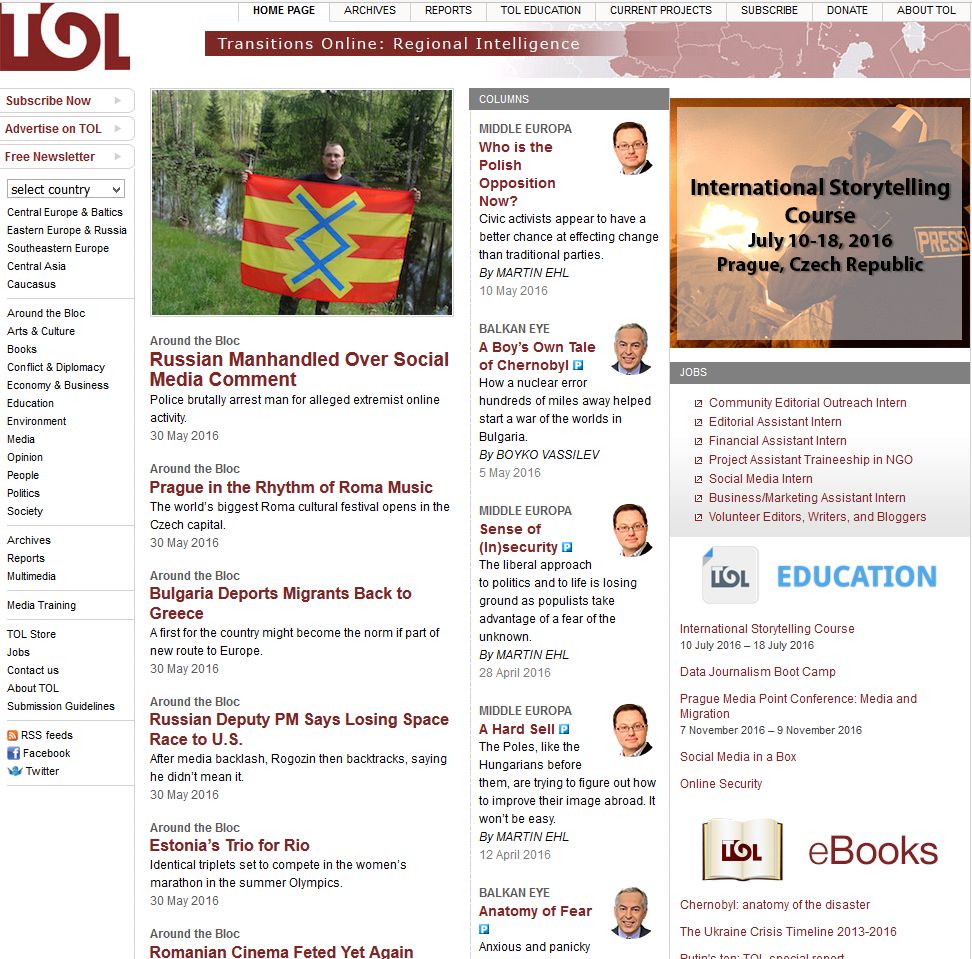
Around the Bloc- An Unlikely Leader in the Making?
Last week the Czech Republic witnessed the emergence of Bohuslav Sobotka as a major new political player.
More...We kindly inform you that, as long as the subject affiliation of our 300.000+ articles is in progress, you might get unsufficient or no results on your third level or second level search. In this case, please broaden your search criteria.

Last week the Czech Republic witnessed the emergence of Bohuslav Sobotka as a major new political player.
More...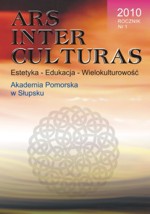
Autor artykułu za przedmiot swoich rozważań obiera zagadnienie znaczenia edukacji muzycznej w budowaniu jedności Europy, opierając się na związku kształcenia muzycznego z historią narodową. Edukacja muzyczna kształtuje świadomość, leżąc u podstaw wszelkich procesów integracyjnych w wymiarze indywidualnym, społecznym i politycznym. Procesy te, rozwijające się w imię przyjętej hierarchii wartości, mają wpływ na to, jak wykorzystywana jest muzyka. Autor przywołał z jednej strony obraz orkiestry w obozie koncentracyjnym Auschwitz (złożonej z więźniów i grającej marszową muzykę) „wzbudzającą” zapał do pracy, a z drugiej o sile patriotycznej płynącej z uprawiania muzyki chóralnej w Estonii. Ważny jest rodzaj muzyki, miejsce jej wykonania i cel, jakiemu służy. Na te aspekty należy zwracać uwagę w edukacji muzycznej, działalności świadomej roli i znaczenia muzyki. Ehrenforth uważa, że w kształceniu muzycznym należy wyeksponować historie narodowe europejskich krajów, zaś w dialogu tych etosów, również w powiązaniu z muzyką dostrzega szansę „zdobycia Europy od wewnątrz”, aby ludzie traktowali ją jako własną ojczyznę. Dalej wskazuje na wybitne dzieła muzyczne, które mogą przyczynić się do podniesienia świadomości internarodowej, ale ostrzega, że młodzi ludzie mogą być podatni na manipulację symboliczną, tym bardziej niebezpieczną, gdyż oddziaływającą na podświadomość, przez co możemy stracić kontrolę nad odbiorem tej sztuki. Autor przypomina, jak ważnym elementem w procesie pojednania polsko-niemieckiego było prawykonanie w Münster Pasji według św. Łukasza (1966) Krzysztofa Pendereckiego, dzieła zamówionego dla uczczenia 700 rocznicy katedry w Münster. W metaforyczno-muzycznym opisie autor przedstawia dzieje pieśni Deutschlandlied odzwierciedlające los Niemiec w ostatnich dwóch stuleciach. Ta napisana przez H. Hoffmanna von Fallersleben (profesora germanistyki z Wrocławia) pieśń jednoczyła duchowo Niemców w rozczłonkowanej Rzeszy. Opublikowana (1841) z melodią Haydna stała się w 1922 roku hymnem narodowym republiki weimarskiej. Strofy Deutschland, Deutschland über alles w czasach hitlerowskich zyskały miano symbolu nazizmu. W roku 1952, po usunięciu owej strofy, pieśń ogłoszono hymnem ówczesnych Niemiec Zachodnich, rozpoczynającym się od słów: „Jedność, prawo i wolność”.
More...
W odniesieniu do tematu „Znaczenie kształcenia muzycznego na tle zróżnicowanej historii naszych narodów w Europie” do rangi zagadnienia naukowego urasta problem: Jak funkcjonują transkulturowe konstrukcje tożsamościowe oraz jak w czasach globalizacji tworzy się kulturowa tożsamość? Jako przykład posłużyć tu może muzyczna socjalizacja we (wschodnio-)żydowskiej kulturze, której istotnym wyznacznikiem tożsamościowym jest muzyka, jaka od dawien dawna tworzona jest z uwzględnieniem historycznej zmienności w przestrzeni pomiędzy kulturami: synkretycznie i transkulturowo. Żydowska, czterojęzyczna pieśń Dem sejdns nign opisuje np. historię różnorodnych migracji poprzez kilka generacji i ujmuje tematycznie konieczność międzypokoleniowego przekazywania muzycznego dziedzictwa. Wreszcie poprzez tę pieśń doświadcza się dramatycznej przemiany od tradycyjnej liturgii po polkę i swing, przez co utwór ten nie traci niczego ze swoich pierwotnych właściwości. Na przykład powstanie muzyki klezmerskiej antycypuje zglobalizowane formy kulturowe i żydowskie wyznaczniki identyfikacyjne. Ze współdziałania tradycji, zinstytucjonalizowanego wychowania, włączenia nastolatka w codzienną praktykę muzyczną, muzyczno-immanentnego wsparcia indywidualnej muzycznej zdolności do wyrażania i specyficznej tradycyjnej pedagogiki żydowskiej wynikają liczne uwarunkowania tej przestrzeni, które umożliwiają kształtowanie się osobistych znaczeń muzycznych i transkulturowych konstrukcji tożsamościowych.
More...
Polish-Ukrainian reconciliation is a remaining key to Europe’s Eastern relations which, with the passing of the generation of its architects, is slowly slipping away. It is also slipping away from the heritage of the changes that took place between 1989-1991. If this movement continues, we could again face the threat of suicidal nationalisms.
More...
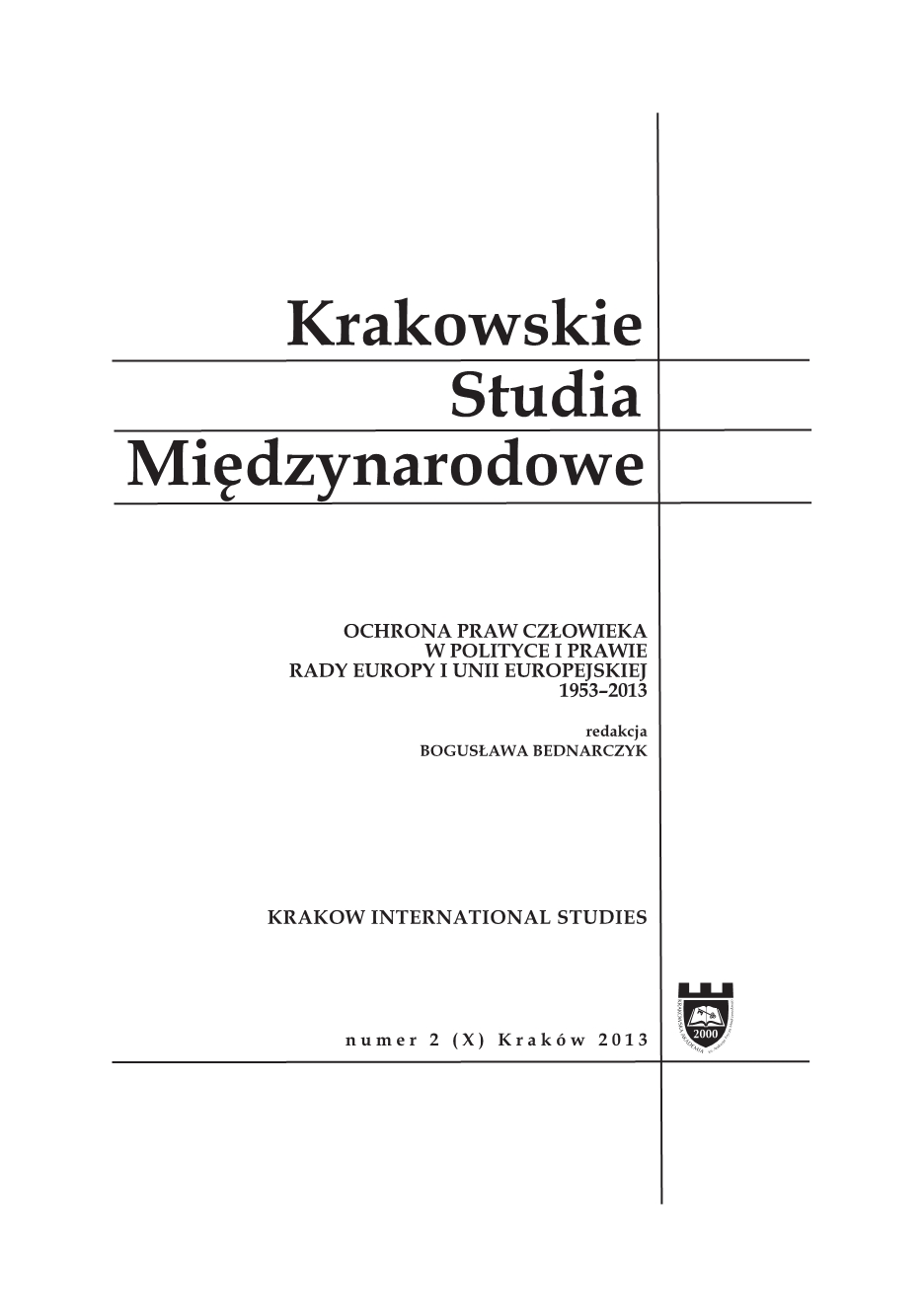

The article examines the correspondence between Viennese women’s rights activist and editor of the monthly magazine Neues Frauenleben Auguste Fickert (1855 – 1910) and Pressburg journalist Elsa Grailich (1880 – 1969), shedding light on the lesser-known Grailich’s role. Their letters, spanning 1907 to 1910, reveal the early phase of the bourgeois women’s movement in Pressburg and the strategic communication between the capital and the periphery. Grailich’s involvement in the women’s and labour movements shaped her intellectual development and social engagement, particularly in maternity protection and proletarian issues. Her critique of local conditions, including chauvinism and clericalism, highlights the challenges faced in realizing progressive ideas. Despite frustrations, the correspondence provided vital moral support, blurring the lines between private and professional spheres. Grailich’s life and work offer a fascinating glimpse into local and superregional contexts of the women’s movement.
More...
This paper analyzes the image of president Vladimir Putin in the cartoons related to the Russian-Ukrainian war, published on the news websiteusnews.com. I will categorize the cartoons starting from the most frequent hypostases of Vladimir Putin since the start of the war, as presented by the cartoonists. The focus will be on the relation between the text and the image(graphic elements) and how it contributes to the final interpretation of the message.
More...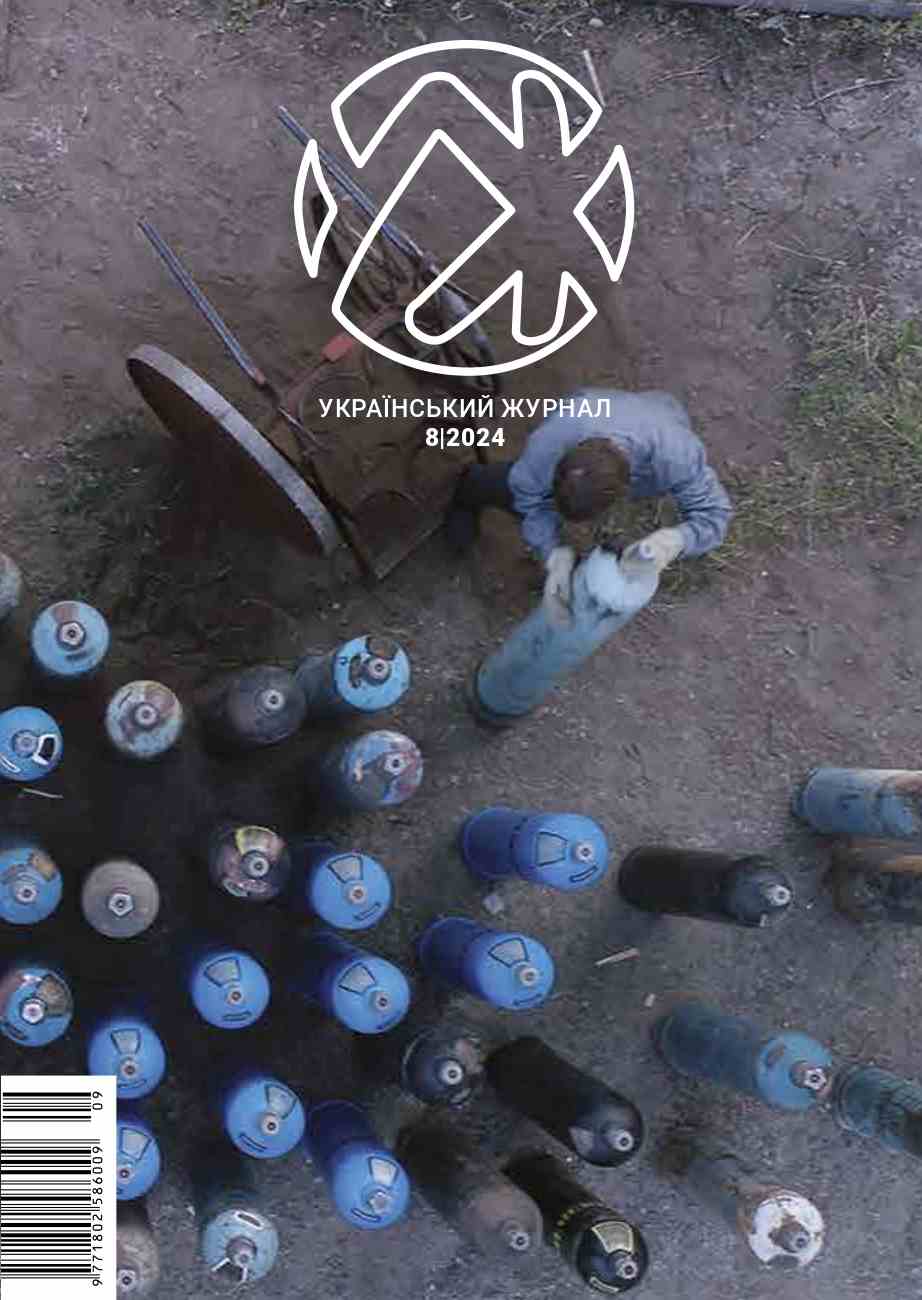
This article lists the films screened at the Ukrainian Film Week festival, which took place from November 26 to November 30, 2024 in Prague and from December 2 to December 8, 2024 in Brno. The documentary "Odposlechy" (Intercepted) by Oksana Karpovyč sheds light on the dehumanization of Russian soldiers during the conflict in Ukraine, using private phone conversations intercepted by Ukrainian intelligence services. "Dům Slovo. Nedopsaný román" directed by Taras Tomenko, set in Soviet Ukraine in 1927, explores the lives of prominent Ukrainian writers and artists housed in a cooperative building as part of Stalin's experiment to create a new type of Soviet artist. "La Palisiada" by Filip Sotnyčenko, set in 1996 Ukraine, follows two old friends, a police detective and a forensic psychiatrist, as they investigate the murder of a colleague, reflecting on their past and its impact on future generations. "Redakce," a satirical drama directed by Roman Bondarčuk, follows a young biologist who becomes embroiled in the murky world of fake news and manipulation as he tries to expose a crime in the Kherson steppes. "Kyslíková stanice" by Ivan Tymčenko is a biographical drama about Mustafa Džemilev, an activist and dissident exiled to Jakutsk, depicting his struggle for the rights of Crimean Tatars. "Hlas Viktorie," a documentary, tells the harrowing story of Victoria Andrusha, a teacher abducted by the Russian army and held captive under inhumane conditions. "Zakořenění" explores the lives of various ethnic communities in Ukraine, highlighting their experiences during the Soviet era and their ongoing struggles. "Ty jsi vesmír" by Pavlo Ostrikov is a tragicomedy set in the near future, where a lonely Ukrainian trucker in space must navigate the aftermath of Earth's unexplained explosion. Lastly, "Klondike," directed by Maryna Er Horbač, set in 2014 Donbas, follows Irka, who refuses to leave her home despite the escalating conflict and her impending childbirth, highlighting the personal toll of war.
More...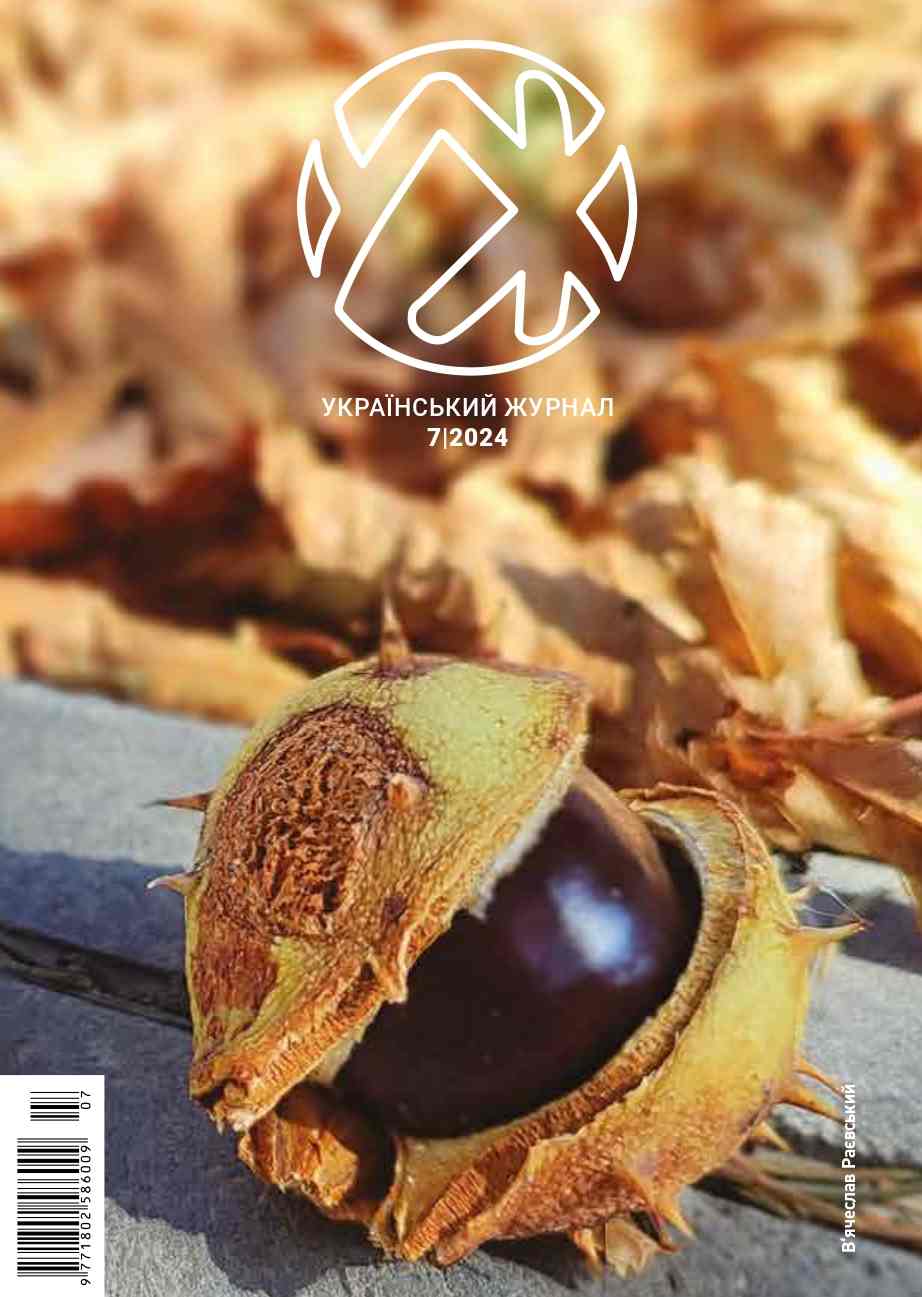
The article discusses the challenges faced by the Ukrainian government in encouraging the return of refugees, highlighting the lack of safety and funds for social programs as major obstacles. Despite official statements about post-war reconstruction and economic revival, there are few concrete proposals to incentivize returns. The text points out that many refugees have settled abroad, with some even obtaining citizenship in their host countries. The article suggests that instead of pressing for their return, the government should focus on building mutually beneficial relationships with Ukrainians abroad, avoiding confrontation. The narrative explores the potential negative consequences of reducing financial support for refugees and emphasizes the need for better communication and realistic policies to maintain connections with the diaspora. The importance of mutual respect and understanding between Ukrainians in the homeland and those who have left is underscored, along with the need for a public discourse and reconciliation strategies to foster a cooperative future.
More...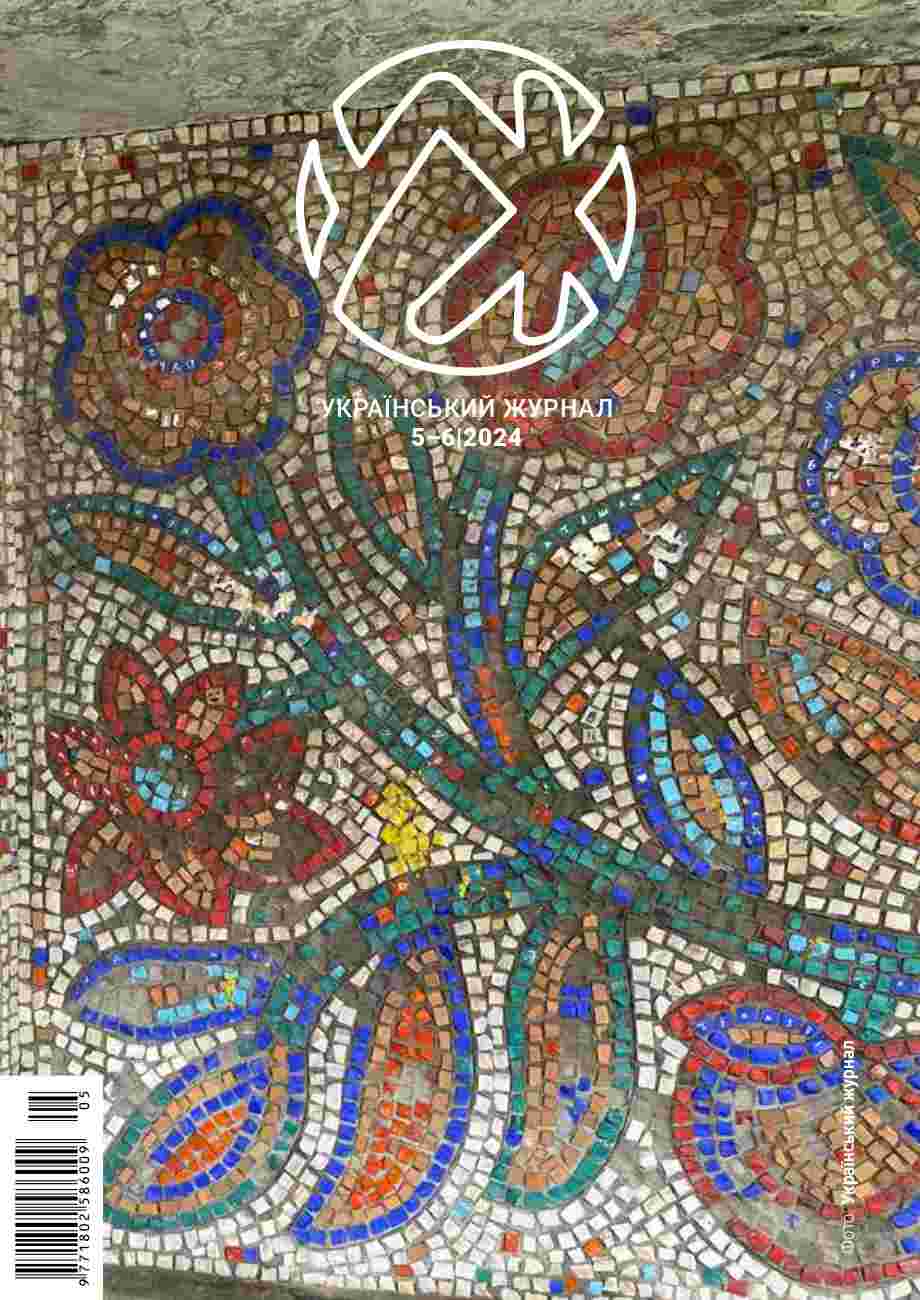
In the summer of 2022, following the liberation of Kyiv, volunteers were asked to dig trenches around the city for better protection. This task, though seemingly mundane, highlighted the deep connection and support civilians felt for the military. The narrative delves into the complexities of writing about war, especially for those who haven’t directly experienced it. It raises questions about authenticity, the right to narrate war stories, and the varied experiences of individuals across different regions and roles. The author reflects on the importance of personal experience in storytelling and the challenges of capturing the true essence of war. The piece emphasizes the need for careful handling of war memories to prevent distortion by propaganda and acknowledges the diverse and invaluable experiences of all involved in the conflict.
More...
Sundays have transformed from days of leisure to days of advocacy for the protagonist, who now spends them raising awareness about the plight of Mariupol’s defenders held in Russian captivity. These peaceful protests, which began in 2022, have become a vital part of life for many Ukrainians, symbolizing solidarity and the relentless fight for freedom. The narrative captures the emotional toll on families, the community’s unwavering support, and the personal stories of those affected by the war. It highlights the importance of collective memory and the ongoing struggle to bring attention to the injustices faced by prisoners of war. The protagonist’s commitment to these actions reflects a broader sense of duty and hope for the eventual return of their loved ones.
More...
Growing up in the 90s, the protagonist’s childhood was filled with the latest gadgets and video games, creating a stark contrast with the outdoor play of other children. Despite parental concerns about the impact of video games, the protagonist’s love for storytelling and strategic thinking flourished. Forced to read books as a form of discipline, the protagonist initially resisted but eventually found solace and inspiration in literature. This journey from reluctant reader to passionate book lover highlights the transformative power of stories. The narrative also touches on the challenges of maintaining a personal library while fleeing conflict, emphasizing the enduring comfort and strength found in books. Ultimately, literature becomes a vital source of resilience and happiness, proving that the right book at the right time can change a life.
More...
In the quiet of night, the protagonist finds solace in the darkness, where reflections in windows transform into glimpses of the outside world. This intimate relationship with darkness evolves into a profound connection, offering comfort and protection from the chaos beyond the room’s walls. The narrative explores the protagonist’s growing affection for the night, highlighting the contrast between the warmth of darkness and the harshness of light. Over time, this bond deepens, revealing the beauty and safety found in the shadows. The protagonist’s journey with darkness becomes a metaphor for understanding and embracing the unknown, ultimately leading to a sense of peace and belonging.
More...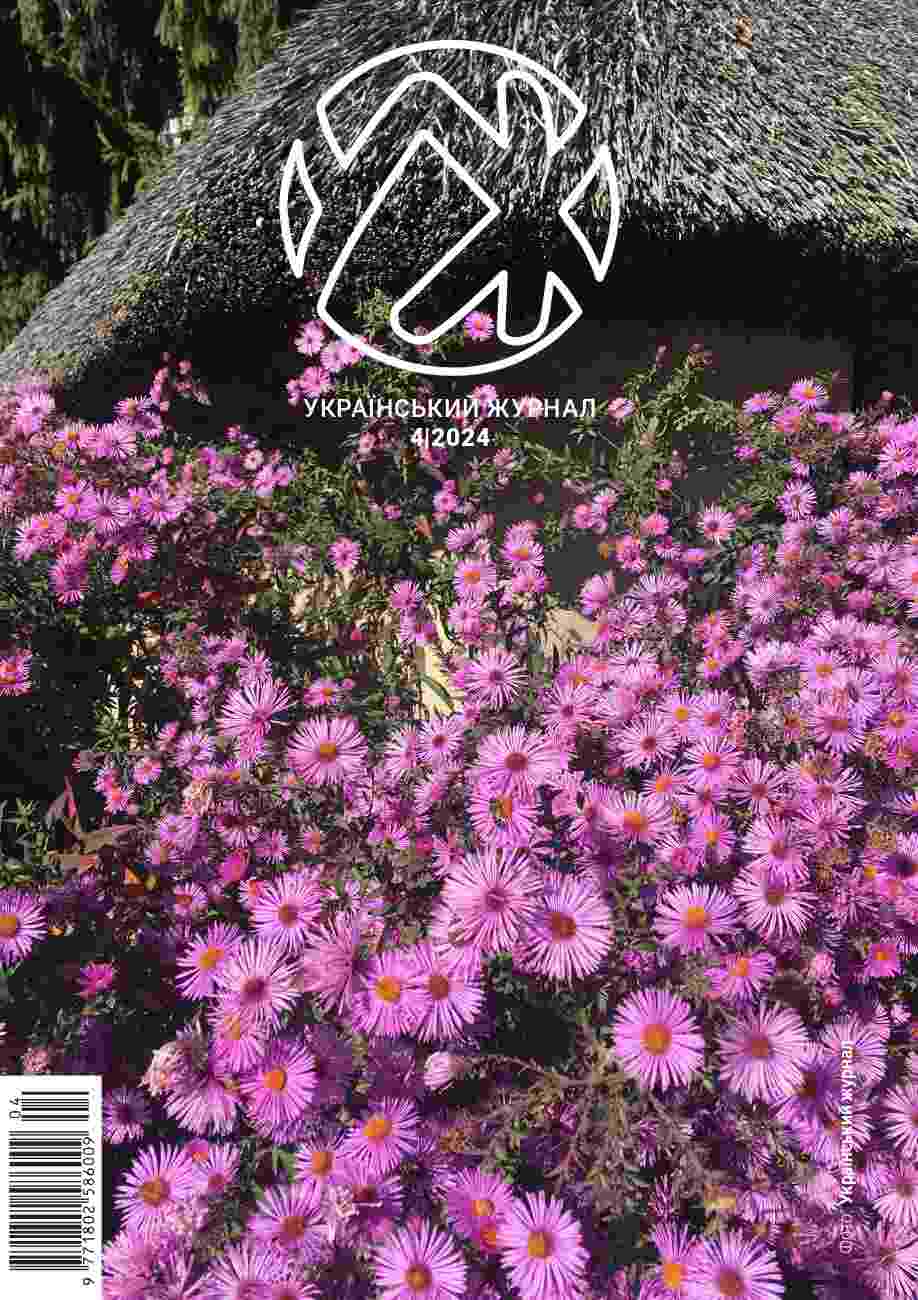
Citizen trust in the Ukrainian parliament has fluctuated significantly over the past 34 years, often hindered by corruption scandals and political conflicts. Despite a brief surge in trust during the early months of the Russian invasion, recent surveys indicate a return to low confidence levels. The parliament’s unity in 2022, reminiscent of the Orange Revolution and the Revolution of Dignity, was short-lived as old issues resurfaced, including the influence of banned pro-Russian parties and legislative inefficiencies. The lack of transparency and chaotic legislative priorities have further eroded public trust. To address these challenges, it is crucial to establish clear legislative priorities, enhance cooperation between the government and parliament, and reduce reliance on votes from pro-Russian factions. Restoring the parliament’s independence and effectiveness is essential for Ukraine’s stability and defense.
More...
Ukraine’s role in the world is evolving, as highlighted by a recent discussion at the Kyiv Book Arsenal. Experts from various fields, including history, political science, and journalism, emphasized Ukraine’s need to see itself as a central player rather than a frontier. The conversation touched on the mental geography of borders, the impact of Russian colonialism, and the importance of Ukraine asserting its narrative globally. The panelists also discussed the geopolitical shifts and the necessity for Ukraine to maintain its cultural and political identity amidst external pressures. The dialogue underscored the significance of Ukraine’s self-perception and its strategic communication to ensure its story is told from its own perspective.
More...
In a compelling discussion at the Kyiv Book Arsenal, Ukrainian intellectuals examined the multifaceted nature of the ongoing war, emphasizing its narrative and psychological dimensions. The panelists, including writers and philosophers, highlighted the importance of countering Russian propaganda and asserting Ukraine’s own narrative. They explored the historical roots of Russian narratives and the need for Ukraine to communicate its perspective effectively to the world. The conversation also delved into the psychological impact of the war on Ukrainian society, the role of identity, and the significance of maintaining cultural resilience. The dialogue underscored the necessity of strategic communication and the power of storytelling in shaping public perception and international support for Ukraine.
More...
In the context of ongoing decolonization efforts, the renaming of streets in Ukrainian cities reflects a broader struggle to redefine national identity and honor contemporary heroes. The process, often initiated by local petitions and supported by community advocacy, highlights the collective effort to move away from Soviet-era legacies. The discussion also touches on the temporary nature of monuments and the societal reluctance to erect new statues, fearing future disillusionment. This hesitation is juxtaposed with the need to commemorate significant figures in modern history, suggesting alternative forms of memorialization such as cultural projects and public spaces. The narrative underscores the importance of community involvement and the evolving nature of public memory in post-colonial Ukraine.
More...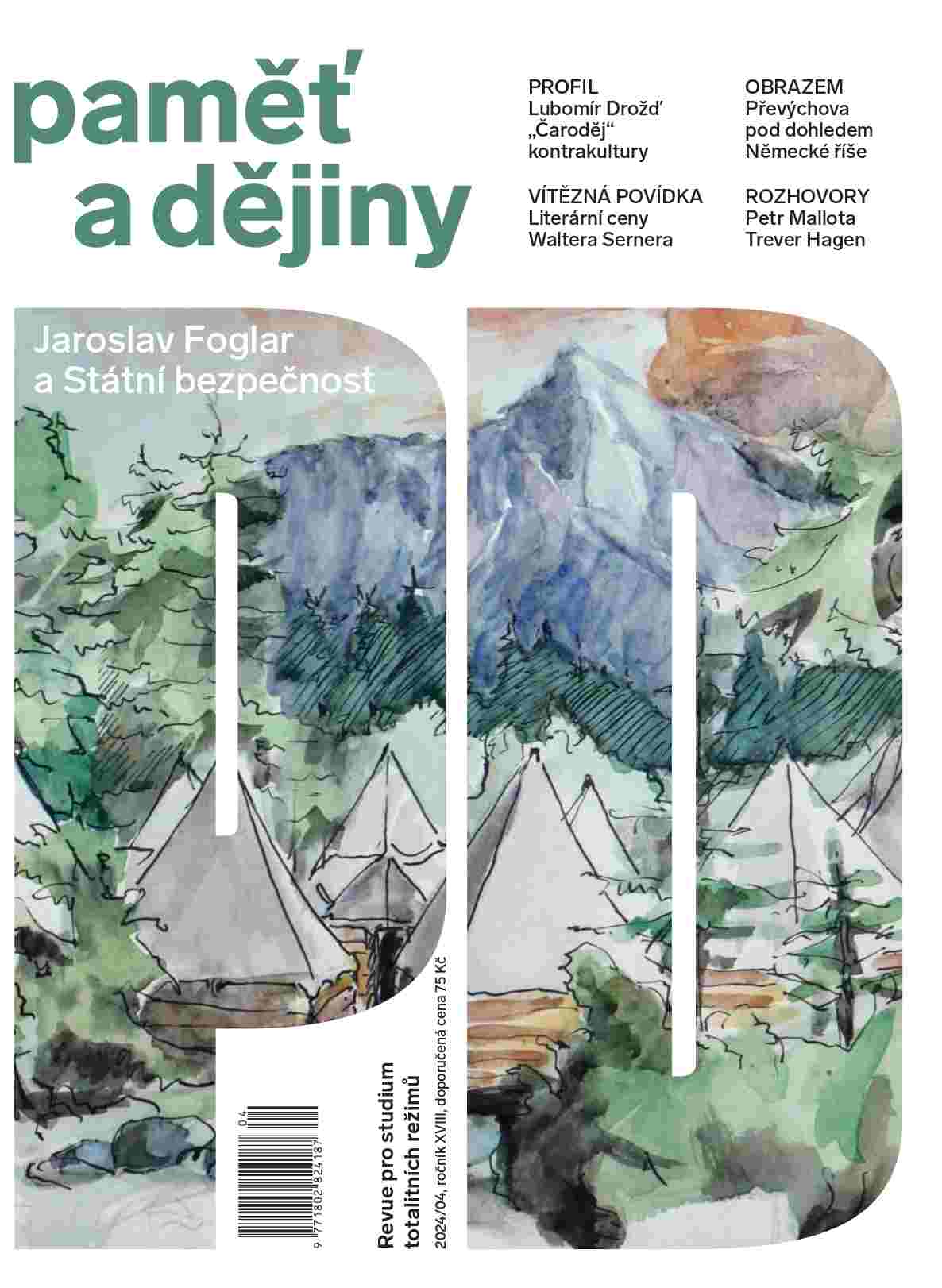
Lubomír "Čaroděj" Drožď, a significant figure in the Czechoslovak underground, was deeply influenced by Western subcultures and the political climate post-1968. His life was marked by a blend of artistic endeavors, pseudonymous writings, and resistance against the communist regime. Drožď's work spanned various mediums, including visual arts, music, and samizdat publications, reflecting his commitment to countercultural ideals. Despite facing numerous challenges, including police scrutiny and societal ostracism, he remained a pivotal figure in promoting alternative cultural expressions. His legacy includes a rich tapestry of underground activities, from organizing happenings to producing samizdat literature, all while navigating the complexities of a repressive political environment. Drožď's story is a testament to the resilience and creativity of the underground movement in Czechoslovakia.
More...
Alexandre-Louis Andrault, Comte de Langeron is an extremely interesting character, with a remarkable military and administrative career, being involved, as a senior officer, in most of the Russian campaigns of the late 18th century and the beginning of the next century. His presence in the Romanian Principalities, both during the Russo-Turkish wars and during the period of occupation and involvement in the peace negotiations, gives him the quality of witness, directly or indirectly, of events and places essential for our history, and not only that. From Count Langeron there remained a fairly consistent set of manuscript Memoirs, drawn up at different stages, which are preserved in the Archives of the French Foreign Ministry. Initially, the manuscript was given by the author, by will, to the library that operated next to L'hôtel des Invalides in Paris, for safekeeping, for 50 years after his death, only after which it was to be made public, which it happened in 1881. After this moment, given the extraordinary wealth of information contained in his accounts, his Memoirs were published under various titles and translations, but never in full. In the present intervention, we also point out the main editions of the Memoirs known to Romanian historiography and of course some contributions that analysed or used this source more consistently. Last but not least, we focused our attention equally on the "reception" of the relations offered by Langeron in his homeland - France, respectively in the country of adoption - Russia.
More...